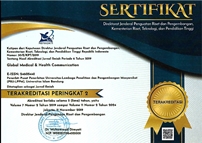Relationship between Emotional and Spiritual Intelligence Levels with Non-Suicidal Self-Injury (NSSI) Behaviour in Adolescents during COVID-19 Pandemic
Abstract
Keywords
Full Text:
PDFReferences
Ghosh R, Dubey MJ, Chatterjee S, Dubey S. Impact of COVID-19 on children: special focus on the psychosocial aspects. Minerva Pediatr. 2020;72(3);226–35.
Singh S, Roy D, Sinha K, Parveen S, Sharma G, Johsi G. Impact of COVID-19 and lockdown on mental health of children and adolescents: an narrative review with recommendation. Psychiatr Res. 2029;293:113429.
Son C, Hedge S, Smith A, Wang X, Sasangohar F. Effects of COVID-19 on college students’ mental health in the United States: interview survey study. J Med Internet Res. 2020;22(9):e21279.
American Psychiatric Association. Diagnostic and statistical manual of mental disorders (DSM-5-TR). 5th Edition. Arlington: American Psychiatric Association; 2013.
Shrestha R, Siwakoti S, Singh S, Shrestha AP. Impact of the COVID-19 pandemi on suicide and self-harm among patients presenting to the emergency department of a teaching hospital in Nepal. PLoS One. 2021;16(4):e0250706.
World Health Organization. Assessment for self harm/suicide in persons with priority mental, neurological and substance use disorders [Internet]. Geneva: World Health Organization; 2015 [cited 2021 May 25]. Available from: https://www.who.int/teams/mental-health-and-substance-use/treatment-care/mental-health-gap-action-programme/evidence-centre/self-harm-and-suicide/assessment-for-self-harm-suicide-in-persons-with-priority-mental-neurological-and-substance-use-disorders.
Kurniawan SL. Hubungan antara kecerdasan emosional dan gangguan jiwa [Internet]. Denpasar: Universitas Udayana; 2016 [cited 2021 June 10]. Available from: http://erepo.unud.ac.id/id/eprint/6092/1/9089edb71257b85760fdd862b951c8dd.pdf.
Goleman D. Emotional intelligence. Kecerdasan emosional: mengapa EI lebih penting daripada IQ. Jakarta: PT Gramedia Pustaka Utama; 2006.
Groschwitz RC, Plenner PI. The neurobiology of non-suicidal self-injury (NSSI): a review. SOL. 2012;3(1):24–32.
Hawton K, O’Connor RC, Saunders KEA. Suicidal behaviour and self-harm. In: Thapar A, Pine DS, Leckman JF, Scott S, Snowling MJ, Taylor E, editors. Rutter’s child and adolescent psychiatry. 6th Edition. Chichester: John Willey and Sons; 2015. p. 893–910.
Zohar D, Marshall I. Spiritual intelligence: the ultimate intelligence. London: Bloomsbury Publishing; 2000.
Yunalia EM, Etika AN. Analisa kecerdasan emosional remaja tahap akhir berdasarkan jenis kelamin. JKJ. 2020;8(4);477–84.
Hamid A. ESQ dan kebutuhan spiritualitas civitas akademik. Al Munir. 2014;5(2):132–51.
Khaliq R, Fatimah S, Melati. Tingkat kecerdasan spiritual mahasiswa ditinjau dari keaktivan dalam ekstrakurikuler keagamaan. J Studia Insania. 2019;7(1):35–51.
Dewi HK, Setyaningrum RH, Putranto RPA. Perbedaan kecerdasan spiritual pada mahasiswa kedokteran Universitas Sebelas Maret berdasarkan waktu pelatihan emotional spiritual quotient. Smart Med J. 2020;3(1):1–6.
Victor SE, Muehlenkamp JJ, Hayes NA, Lengel GJ, Styer DM, Washburn JJ. Characterizing gender differences in nonsuicidal self-injury: evidence from a large clinical sample of adolescents and adults. Compr Psychiatry. 2018;82:53–60.
Zhang YY, Lei YT, Song Y, Lu RR, Duan JL, Prochaska JJ. Gender differences in suicidal ideation and health-risk behaviors among high school students in Beijing, China. J Glob Health. 2019;9(1):010604.
Miranda-Mendizabal A, Castellví P, Parés-Badell O, Alayo I, Almenara J, Alonso I, et al. Gender differences in suicidal behavior in adolescents and young adults: systematic review and meta-analysis of longitudinal studies. Int J Public Health. 2019;64(2):265–83.
Evans R, Parker R, Russell AE, Mathews F, Ford T, Hewitt G, et al. Adolescent self-harm prevention and intervention in secondary schools: a survey of staff in England and Wales. Child Adolesc Ment Health. 2019;24(3):230–8.
Vine V, Byrd AL, Mohr H, Scott LN, Beeney JE, Stepp SD. The structure of psychopathology in a sample of clinically referred, emotionally dysregulated early adolescents. J Abnorm Child Psychol. 2020;48(11):1379–93.
MAA Zoromba, SA Abdellatif, ES Hussien, WE Hamed. Relationship between emotional intelligence and levels of depression among patients with depressive disorders. MNJ. 2015;2(1):45–54.
Foster B, Lomas J, Downey L, Stough C. Front Psychol. Does emotional intelligence mediate the relation between mindfulness and anxiety and depression in adolescents? 2018;9:2463.
DOI: https://doi.org/10.29313/gmhc.v11i1.9268
pISSN 2301-9123 | eISSN 2460-5441
Visitor since 19 October 2016:
Global Medical and Health Communication is licensed under a Creative Commons Attribution-NonCommercial-ShareAlike 4.0 International License.






























.png)
_(1).png)
_(1).jpg)
